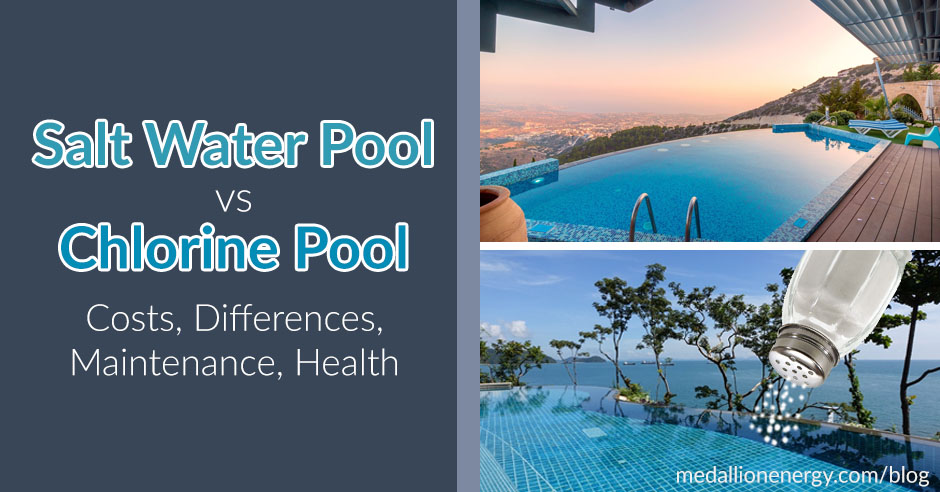Can’t decide between a salt water or chlorine pool? Trying to understand the difference between the two?
Well, you’re not alone. Plenty of pool owners ask these same questions all the time. And they’re important.
When it comes to a salt water pool vs chlorine pool, there are a few key differences that set them apart. And while both serve as excellent choices for your pool, understanding their pros and cons is essential to making the right decision.
In this post, we go over everything you need to know about salt water and chlorine pools. So by the end of it, you’ll be fully informed and ready to choose.
Disclaimer: In this post, we say “chlorine pool” a lot. Keep in mind that both saltwater pools, and “chlorine pools” use chlorine. Just different forms of it, with different ingredients. The distinction is to keep things simple when explaining the differences between the two.
Salt Water Pool vs Chlorine Pool: Advantages, Differences, and Costs
The main difference between a salt water pool and chlorine pool
Almost everything you need to know is in the names.
While both salt water and chlorine pools use chlorine, the way the chlorine is produced is what sets them apart.
Regular chlorine pools use added pre-made chlorine, in the form of liquid, powder, or tablets. This type of chlorine is typically the most concentrated, but also contains more added ingredients.
Salt water pools, on the other hand, create their own chlorine in-house. With help from the saltwater chlorine generator cell, these systems sanitize your water by electrically processing salt into usable chlorine.
It’s the same type of chlorine you would use in a chlorine pool but in a much gentler and chemically mild form. This is why people say the water in salt water pools feels so soft, but more on that later.
Salt Water Pool vs Chlorine Pool: Health
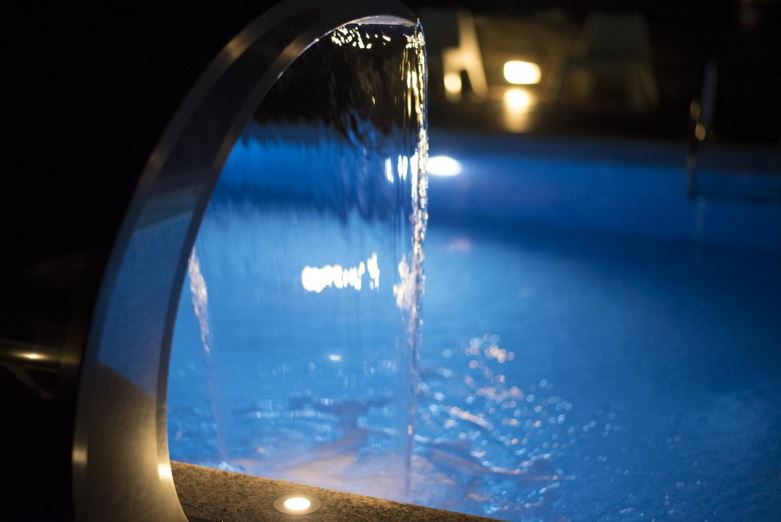


The biggest physical difference between salt water and chlorine pools is the way the water feels. Salt water chlorine is less concentrated and milder than bottled chlorine, so it’s gentler on the skin, and less likely to irritate.
While both sanitize your water effectively, saltwater chlorine simply feels softer, and lighter. It’s also a lot safer for clothes, and won’t fade colors like chemical chlorine.
On the other hand, chemical chlorine is known for causing dry itchy skin, and even respiratory problems for some. This is because store-bought chlorine is more concentrated, and tends to contain more added ingredients.
But what about red eyes? Will a salt water pool stop red eyes?
Red eyes can happen with both saltwater pools or chlorine pools. That’s the unfortunate truth,
It caused by out of balance chlorine levels, and the amount of chloramines (sanitized contaminants) in the water. Chloramines are what cause the most irritation. So if your water is dirty, then your eyes are probably coming out red.
To avoid red eyes: keep your chlorine levels in balance, whether you have a saltwater or chlorine pool.
Another important health concern with regular chlorine is storage.
With salt water pools, you only need space for storing a few bags of salt. Since they’re non-toxic, they don’t require special storage, and just need to be kept dry.
But regular chlorine is different. Chemical chlorine can let off toxic odors when stored improperly, especially in hot humid conditions. Therefore, it’s important to follow manufacturer instructions for storing chlorine chemicals properly, and safely.
By rule of thumb, keep all chlorine chemicals in a tightly sealed container, in a dry vented area away from your living space.
Related: 9 Surprising Benefits of Salt Water Pools
Do saltwater pools taste like salt?



No. You’d need A LOT more salt to taste saltiness in the water.
Most chlorine generators require a salinity level between 2,500-4,500 ppm to run. So for setting up a 15,000-gallon pool for the first time, that’d be around 425 pounds of salt to reach a level of 3,4o0 ppm.
The ocean has an average salinity level of 35,000 ppm. That’s 10x more salt.
So no, you thankfully won’t taste the salt in your pool. But your water will still feel soft and silky.
Salt Water vs Chlorine Pool: Costs
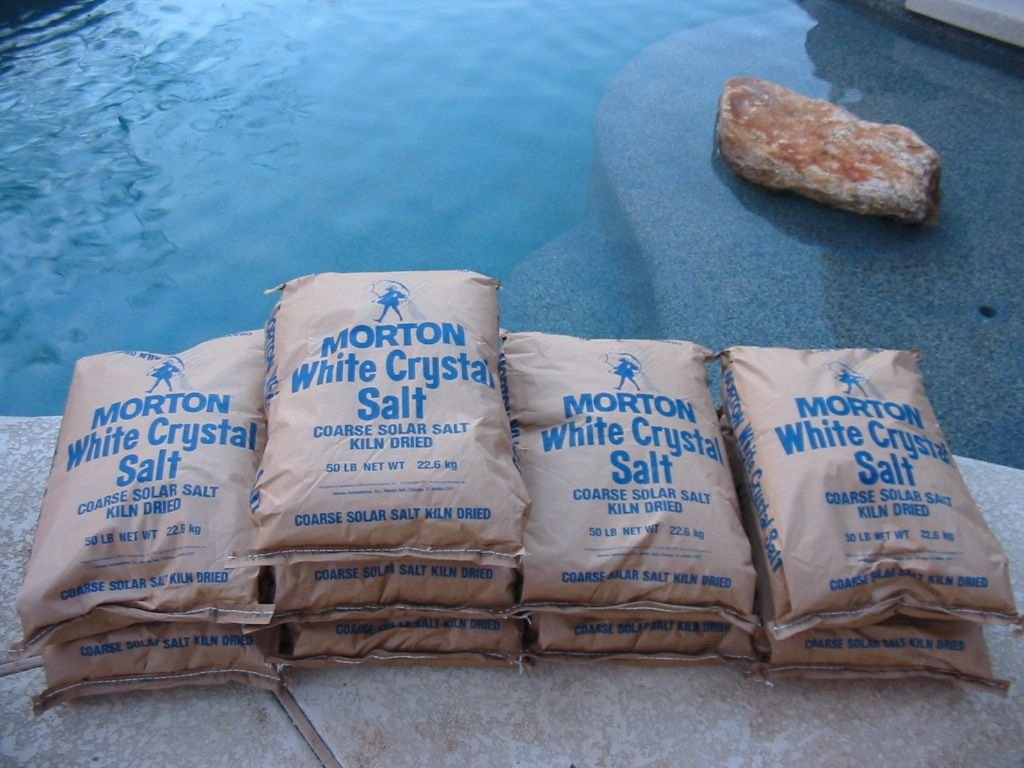


This is another area that really sets chlorine and salt water pools apart.
Salt water pools are more expensive to set up, initially. But after initial setup, they’re WAY cheaper than chlorine pools.
This is because salt water pools utilize a special piece of equipment, called a salt water generator. These machines process the salt in the water and turn it into useable chlorine.
Here are the main costs for running a saltwater pool system:
- Salt water generator
- Cost: between $400-$3000
- Needs power center replaced every 5-10 years
- Salt water generator cell
- Cost: $200-$800
- Lasts 2-6 years
- Bags of salt
- Cost: $3-$6 per 5 pound bag
- Most pools require 400-1,000 pounds of salt ($50-$125) for initial setup
- Cost per year (after initial set up): $70 to $100
- Cost: $3-$6 per 5 pound bag
Saltwater pool average cost per year: $85
While chlorine pools cost less for initial setup, they’re more expensive to sanitize per year. This is because per month, store-bought chlorine is 3 to 8 times more expensive than using salt.
A saltwater pool costs about $70-$120 per year (salt), where a chlorine pool costs $300-$800 (chemical chlorine). So even with the added cost of running a salt water generator, saltwater pools are still cheaper than chlorine pools.
Related: 7 Cheap Ways To Lower Your Swimming Pool Bills
Salt Water Pools vs Chlorine Pools: Maintenance
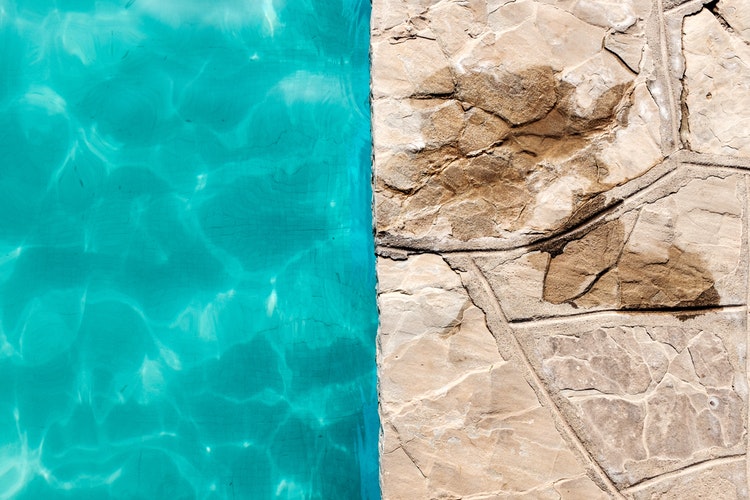


Overall, pool maintenance is pretty much the same whether you have a chlorine or salt water pool
With both pools, you still have to:
- Skim, brush, and vacuum
- Balance all the other chemicals (Alkalinity, pH, Calcium Hardness, etc.)
- Clean your filter
- Service your pool heater
- Cover the pool
- Empty the skimmer & pump baskets
- Sweep the deck
That said, there are some small differences between the two.
You can set up salt water pools to regulate chlorine levels for you. This, of course, depends on the salt water generator system you’re using. That said, most models offer this feature and can actively monitor chlorine levels.
Salt water pool systems also let you easily adjust the chlorine production rate, via the control panel. This makes managing pool chemicals use a lot easier.
Of course, a potential drawback of salt water pools is that pH levels tend to fluctuate a bit more. This is for two reasons:
- Salt water generated chlorine is unstabilized (burns up under the sun faster, fluctuates more)
- For the best results, add a stabilizer (CYA) to your saltwater pool to boost chlorine effectiveness. It’ll make the chlorine last longer and serve as a shield against UV rays
- The amount of salt in your water affects the generator:
- Too much salt can cause corrosion and inaccurate chlorine readings.
- Too little salt can cause the generator to automatically shut down
Related: 12 DIY Pool Cleaning & Maintenance Tips For Quick Improvising
Tips on converting chlorine pool to saltwater
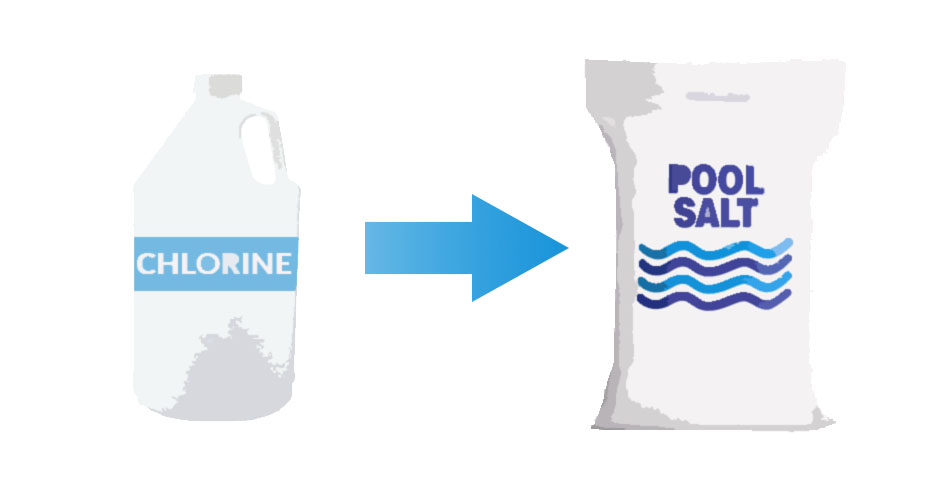


Before converting your chlorine pool to salt water, remember:
- Salt water can be corrosive to certain types of pool fixtures and surfaces
- Check that your pool fixtures are safe for use with a salt water system. If not, replace them with salt water safe alternatives.
- The initial cost to install a salt water system ranges from $500 to $3,000
- This is offset by significantly cheaper annual supply costs (salt). You’ll spend way less buying salt throughout the year than you would buying bottled chlorine.
To convert your chlorine pool into a salt water pool, you’ll need to purchase a salt water chlorine generator.
Once you have it, you can install it into your existing pool system. We recommend getting professional help with this.
With your saltwater chlorine generator installed, all that’s left to do is add salt. As previously mentioned, you’ll need several bags of salt for the first time.
For most pools, this ranges between 30-40 bags of salt. Of course, be sure to calculate the correct amount for your pool size.
Let the water circulate for a couple hours, then go back and test your chlorine levels. From here on out, it’s as simple as pouring in salt every few days.
Salt Water vs Chlorine Pool: PROS and CONS
Now that we’ve gone over everything you need to know about the two types of pools, let’s do a quick recap. If you’re still trying to decide between a salt water or chlorine pool, this comparison chart should make it easy:
CHLORINE POOLS: PROS and CONS
PROS/Advantages of chlorine pool
- Easy to use and maintain
- Lower initial cost
- Uses less energy
- Less likely to damage pool and features
- Automatically stabilized with CYA for UV protection
CONS/Disadvantages of chlorine pool
- Higher long-term costs ($300-$800 per year)
- Need to add chlorine often
- Chlorine storage takes up space and requires special handling
- Liquid, granular, and tablet chlorine is chemically harsher than salt generated chlorine
- Causes itchiness and dry skin
- CYA buildup can cause water balancing problems, and require pool draining
SALT WATER POOLS: PROS and CONS
PROS/Advantages of salt water pools
- 3 to 8 times cheaper per year ($70-$120)
- Doesn’t take up a lot of storage space
- Softer water and gentler on the skin
- Doesn’t dry skin or cause itchiness
- Safer
- Easily adjustable chlorine production rate
CONS/Disadvantages of salt water pools
- pH levels tend to be higher, more adjustment
- Salt cells need regular cleaning (with muriatic acid)
- Replacement cost for cells
- High initial setup cost ($500-$3,500)
- Needs replacement every few years (average of $500)
- Saltwater runoff damages grass and plants
- Maintaining the right level of salt (low causes shutdown, high causes corrosion)
If you liked this post, you might also like:
Fiberglass vs Vinyl vs Concrete Pools: Advantages and Disadvantages
20 Common Swimming Pool Myths: Busted
11 Simple Pool Landscaping Ideas

